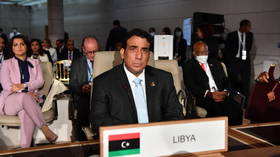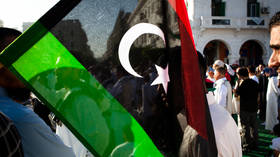Libyan leaders agree to cooperate after decade-long division

Libyan leaders have agreed to form a unified government that would supervise long-delayed elections. The North African nation has been divided between rival administrations since the 2011 NATO-backed invasion, which saw the overthrow and execution of longtime ruler Muammar Gaddafi.
The decision, announced on Sunday, came after a meeting between the heads of the Tripoli-based Presidential Council (PC), Mohamed Yunus al-Menfi, and the High State Council (HSC), Mohamed Takala, as well as Aguila Saleh, speaker of the House of Representatives (HoR) in Benghazi. The Arab League mediated the talks, which took place in Cairo, Egypt.
The three leaders agreed to form a technical committee to “look into controversial points” and consider amendments to expand consensus, the Arab League said in a statement. They also called on the UN Mission in Libya and international partners to support their proposals.
“Egypt considers the outcome of this meeting to be an important step on the path of achieving the legitimate aspirations of the brotherly Libyan people in moving towards the future, preserving Libya’s sovereignty, unity, security and stability,” Cairo’s foreign ministry said in a separate statement.
Libya remains fractured and conflict-torn, more than a decade after Gaddafi’s overthrow. Rival factions control different parts of the once-prosperous African country, with two major competing authorities in the capital, Tripoli, and the eastern city of Tobruk. There have been several attempts to unite them, but all have failed. UN-backed elections scheduled for December 2021 were canceled at the last minute due to disagreements over candidate eligibility and rules, including those for verifying results.
Menfi became PC chairman in 2021, when the interim Government of National Unity (GNU), led by Prime Minister Abdulhamid al-Dbeibah, was installed as part of a UN-backed process to prepare for elections. The Libyan parliament no longer recognizes the GNU’s legitimacy, but Dbeibah has said he will only hand over power to a successor when elections are successfully held.
The High State Council, established as part of a 2015 agreement, has a major say in political matters in the oil-rich country and has been negotiating an electoral path with the main parliament in Tobruk, the House of Representatives, which was elected in 2014.
“The measures that were agreed upon today, we believe, are a very important beginning. They are results that live up to the ambition of Libyans to hold elections,” Menfi told reporters after the Cairo talks, according to Reuters.
The international community has long advocated for parliamentary and presidential elections to help resolve the Libyan conflict. Last July, at the Russia-Africa summit, Russian President Vladimir Putin pledged to support Libya as it seeks to achieve national unity and sovereignty when he held talks with PC chairman Menfi.













